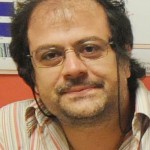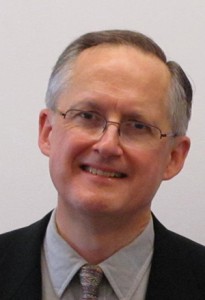Kottos, Rushdy, Scowcroft Appointed Endowed Professorships
Three Wesleyan faculty members received endowed professorships for the 2013-14 academic year.
Tsampikos Kottos, associate professor of physics, is being honored with the Douglas J. and Midge Bowen Bennet Chair. The Bennet Chair, endowed in 2007, is awarded for a five-year term to “a newly tenured associate professor exhibiting exceptional achievement and evidence of future promise.”
Ashraf Rushdy, professor of English, professor of African-American studies, is being awarded the Benjamin L. Waite Professorship in English Language, first appointed in 1911.
Philip Scowcroft, professor of mathematics, is receiving the Edward Burr Van Vleck Professorship in Mathematics. The Van Vleck chair was created in 1982.
“Please join me congratulating Tsampikos, Ashraf, and Philip in recognition of their impressive intellectual achievements and institutional contributions,” said Rob Rosenthal, provost and vice president for academic affairs.

Tsampikos Kottos arrived at Wesleyan in 2005, having earned his B.Sc., M.Sc. and Ph.D., all in Physics, from the University of Crete, in Greece. Tsampikos develops models and theories of mesoscopic systems, those systems that are too small to be part of the macroscopic world and are described by the laws of quantum mechanics. His work, which is at the forefront of his field, has implications for designing and building nano-devices, quantum dots and atomic traps. Kottos has been recognized for his efforts with a number of grants from the National Science Foundation, the Air Force and the German National Science Foundation. In 2007, he was a visiting fellow at the Newton Institute in Cambridge, U.K. and was awarded the International Pnevmatikos Award, given biannually to an outstanding researcher in nonlinear phenomena. He is a prolific scientist and has published 45 peer-reviewed papers since coming to Wesleyan. Last year, he published a paper, resulting from a collaborative effort with Fred Ellis, highlighted by the editors of Physics Review A as exceptional research. Last year, Kottos’s research student was able to secure a highly prestigious National Defense Science and Engineering graduate fellowship.
“His colleagueship is also outstanding, with efforts continually directed toward improving the department and the research environment,” Rosenthal said.

Ashraf Rushdy received his BA and MA in English from the University of Alberta and then went on to the University of Cambridge, where he received his Ph.D. He has been a prolific scholar, having authored over thirty articles and five well-received books since coming to Wesleyan in 1992: The Empty Garden: The Subject of Late Milton (Pittsburgh: University of Pittsburgh Press, 1992); Neo-Slave Narratives: Studies in the Social Logic of a Literary Form (New York: Oxford University Press, 1999); Remembering Generations: Race and Family in Contemporary African American Fiction (Chapel Hill: University of North Carolina Press, 2001); The End of American Lynching (New Brunswick, NJ: Rutgers University Press, 2012); and American Lynching (New Haven, Yale University Press, 2012). He is also the winner of numerous grants and honors, including fellowships from the Mellon Foundation, Ford Foundation, National Humanities Center, as well as the Binswinger Prize for Excellence in Teaching at Wesleyan.
“Ashraf has been an exemplary university citizen, serving as chair of AFAM, as Academic Secretary, and on several university committees, including his current service on the Advisory Committee,” Rosenthal said.

Philip Scowcroft was educated at Harvard, Oxford and Cornell, where he earned his Ph.D in 1983. After postdocs at Yale, Ohio State and Stanford he came to Wesleyan in 1989. Scowcroft’s research, in mathematical logic, has concentrated on model-theoretic algebra and intuitionistic mathematics and has appeared in journals including The Journal of Symbolic Logic, Annals of Pure and Applied Logic, and Transactions of the American Mathematical Society. He has received grants from the National Science Foundation, has visited the Mathematical Sciences Research Institute (Berkeley) and the Newton Institute (Cambridge), and was University Lecturer in Mathematical Logic at Oxford in 1998-99. At Wesleyan he was Chair of the Department of Mathematics and Computer Science during 2000-2002 and has served on the Review and Appeals Board.
“Philip is a strong teacher and good department citizen; the surge in majors has led him to teach the highest number of students in his area. His colleagueship is outstanding; as an expert in logic, he regularly helps colleagues develop their mathematic proofs,” Rosenthal said. “He has also contributed considerable service to the university and is currently serving on the Review and Appeals Board.”

